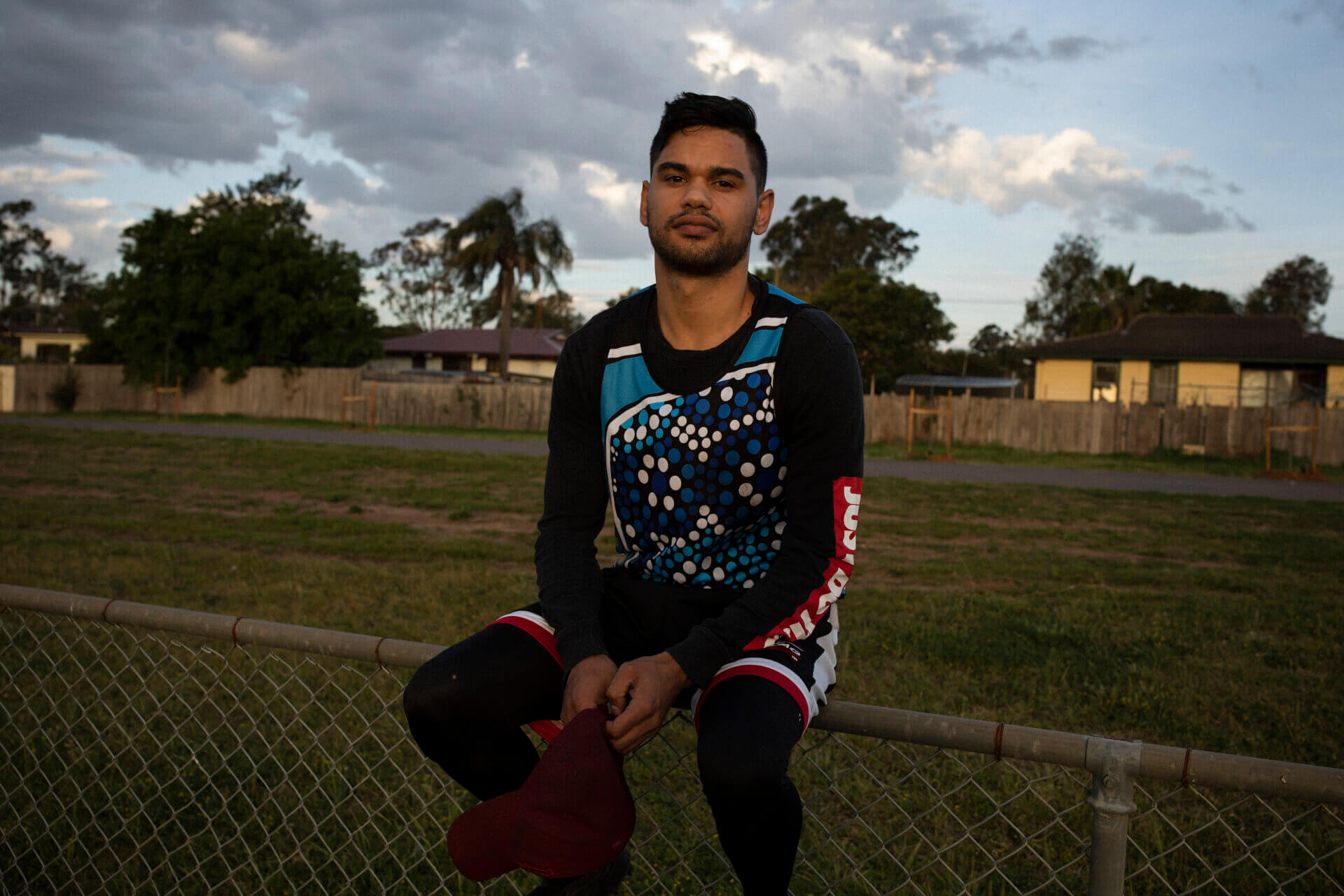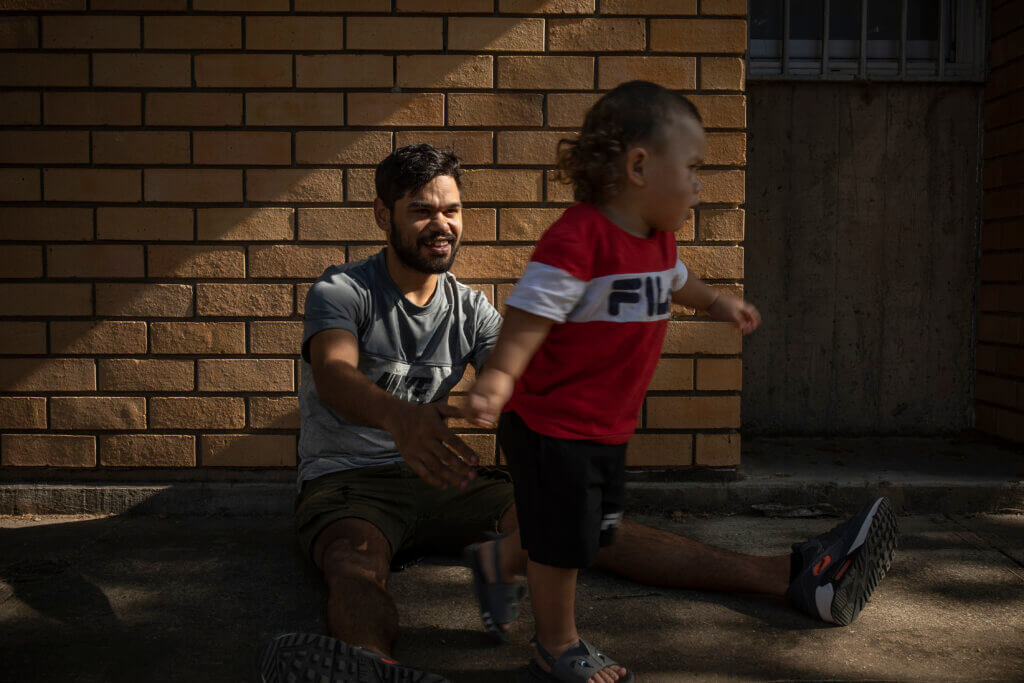From ‘supermax for kids’ to family man and Indigenous role model

Originally published by The Guardian, January 22, 2021. Author: Laura Murphy-Oates
The young adult: Isaiah spent his teen years in and out of youth detention. Now he’s using his experience to reach others like him in western Sydney
It’s five minutes before kickoff of the Penrith Oztag men’s semifinals in western Sydney, and there’s a problem.
Two players on the all-Indigenous Native Sons team haven’t played enough games this season to qualify. The boys in question have been embroiled in the justice system and couldn’t make all the games.
After some back and forth, it’s decided the boys are good to go, doing something most people would take for granted: playing sport.
This team represents Mount Druitt, a strong Indigenous community but also a suburb where more young people are under surveillance, via a secretive New South Wales police blacklist, than anywhere in the state.
The idea for the touch football team started with Isaiah, who works as a youth engagement officer for Just Reinvest NSW, a non-profit organisation focused on the overrepresentation of Aboriginal and Torres Strait Islander young people in custody.
He grew up in this area, and remembers footy games were often broken up by police, who told players to move on.
Under NSW consorting laws it’s an offence for a person 14 years or older to “habitually consort with convicted offenders after being warned not to by police”. The laws were introduced in 2012 as part of a crackdown on outlaw motorbike gangs but a review in 2016 found they were frequently being used to target young Indigenous people.
“They couldn’t even go to a park to play football,” says Isaiah’s friend and mentor Daniel Daylight, a 33-year-old Gamilaroi man and Just Reinvest executive committee member.
So a plan was hatched. Isaiah designed the jerseys – an Indigenous design that features the handprints of his young son.
“I turned it into a jersey for the brothers because through Oztag we’ve created a community and a family – we are there for each other,” he says.
The outfits, transport costs and registration fees came from the Western Sydney Community Legal Centre and Just Reinvest. Now there’s a demand for more teams, including a girls’ and a mixed team.
These games are important. The boys won’t engage with most social services in Mount Druitt, but they’ll turn up for Oztag, and they want to train and play more.
“We’re doing something we love,” Isaiah says. “You get them playing footy together, you’re gonna hear nothing but laughing … to be a part of something, I suppose, it makes them feel included, you know?”
For Isaiah, a team like this could have made a big difference for him when he was younger. With nothing to do, he quickly found himself in trouble.
At 12 years old, he spent his first night in police custody. At 13, he was strip-searched on his way to the shops with a big group of friends. From a group of 13 children, Isaiah says he and his cousin – the only black kids in the group – were singled out for questioning. He was told to strip down to his underpants on the side of a busy road.
“It was embarrassing,” he says. “I didn’t know what to do, so I just complied.”
Indigenous kids are significantly overrepresented in the number of strip-searches conducted by police in NSW. Eleven per cent of the more than 450 children who were strip-searched between 2016 and 2019 were Indigenous, despite Indigenous children being about 6% of the under-18 population.
NSW police have also been operating a blacklist known as the STMP, largely made up of Indigenous children deemed to be at risk of committing crimes.
Many of the children – including some as young as nine – have not been charged with a crime and are not aware they are a target. The NSW Law Enforcement Conduct Commission found that police were using “unreasonable surveillance” and harassment that could increase young peoples’ risk of entering the justice system.
Between 2017 and 2019, the state’s highest concentration of kids subject to the STMP was in Mount Druitt.
Isaiah doesn’t know if he was on the STMP. He just knows there were periods when he was stopped by police almost daily. One time he was stopped twice by the same police on the same day. The first time he was strip-searched. The second time he was questioned.
“I don’t know if we were targeted, but it happened to us quite a lot when we were younger,” he says.

At 16, he was sent to youth detention and spent over 3 years in and out of custody, getting out at 20. But being inside was a chance to reunite with family and friends.
“It’s like a Mount Druitt reunion in there,” he says. “I had a three-course meal and I got a bed to sleep in. At one stage there was 40 of us. Almost every unit was full of us boys from Mount Druitt.”
In 2016 he was released for the day to attend his auntie’s funeral. He was one of six who arrived in handcuffs.
“I mean handcuffs from head to toe,” he says. “I couldn’t even hug my brothers – and I’m the baby brother.”
In 2015 Isaiah was placed in the Chisholm behaviour program, run across two youth detention centres, including Cobham juvenile justice centre on the outskirts of Sydney, where Isaiah was held. Over the lifetime of this program, 66 “high-risk” detainees, many of them Aboriginal, were separated from the general youth detention population. The program was dubbed by people working in the system as a “supermax for kids”.
Isaiah says he was greeted by “officers with shields and helmets”. He was kept in a tiny cell with a see-through door, surveilled by cameras. Most of the time, if he wanted to use the toilet or brush his teeth, he had to buzz for a guard.
“We weren’t even allowed a change of clothes in our room, we weren’t even allowed a towel. We had to eat with our hands for the first two weeks – breakfast, lunch and dinner.”
In 2016 Youth Justice NSW was forced to close the program down, after legal complaints about extensive isolation of boys.
A 2018 report by the NSW inspector of custodial services found that young people were in isolation 22 hours a day, for weeks at a time. Isaiah was in the program for 199 days.
“Most of the boys just go crazy,” he says. “Just kind of talking to themselves and shit. No kid ever should ever go through that.”
It was around this time that Isaiah met Daylight, at the youth Koori court, where magistrates, elders and youth workers try to divert kids away from the justice system.
Isaiah appeared for an offence committed in youth detention. When he walked in he was amazed. “I’ve never seen this many blackfellas in a room,” he joked.
The Koori court began figuring out what he needed for his life after detention. They linked him up with services, to create a “leaving care” plan that would help him transition from being in care to adulthood.
Juvenile Justice and Daylight arranged for him to get his driving licence and organised housing. In the last three months of Isaiah’s sentence, Daylight would take him to visit relatives. Sometimes, the two of them would just hang out.
“I’ve never met anyone like him,” Isaiah says. “I wish I did meet more people like him … that’s the workers they should have in juvies.”
When Isaiah was finally released, he assumed it wouldn’t be for long.
“I wouldn’t have even thought I would last two days … a day! Yeah, I’ve got Dan and a lot of people to thank for that.”
It’s more than two years since Isaiah left youth detention behind him. In that time he has started a family; he has two young boys. He’s working with Just Reinvest on a project called Mounty Yarns, which plans to gather stories from young people about what it’s like to get trapped in the system, and what it can do to your mental health.
“Young people in Mount Druitt want services that operate outside of nine to five, they want youth workers who care, they want to stop being harassed by the police,” Isaiah says.
In October he was named Youth Action’s NSW emerging youth worker of the year.
But Isaiah is an outlier. Daylight says many of the other boys he’s met are now back in jail. When he visits, they ask after Isaiah.
“They’re all proud of him,” Daylight says. “For them he’s that fella who stayed out, you know? And so he’s that hope for these fellas when they get out, in a couple of years.”
Back at the Kingsway playing fields, the hooter goes for full-time. The Native Sons have won 6-3 and they’re off to the grand final. The boys are ecstatic.
Later, in the car park, they crowd around Isaiah’s car, posing for their victory portrait.
I ask Isaiah what he would say to kids who are still inside right now, losing hope.
“My advice is just, this is … better than crime. Like, there’s more to life, there’s a lot more opportunities than getting told when to eat, when to shit, when to shower. Getting told when to wake up, when to go to sleep.
“There’s way more to do than to be behind them fucking doors.”
Leave a Reply